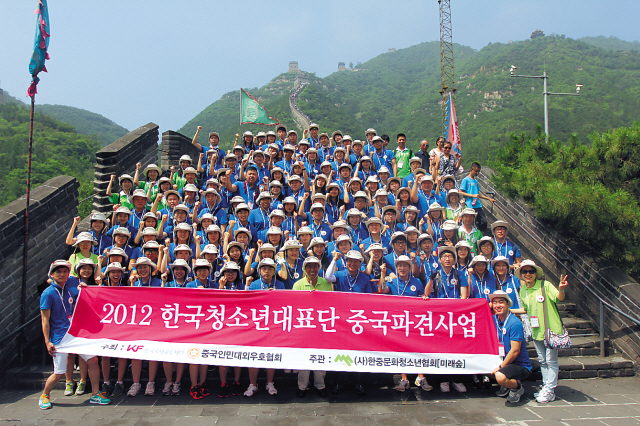History book, exchange programs aim to promote Korea-China understanding
By Korea HeraldPublished : Aug. 19, 2012 - 20:35
Many Chinese people believe Seoul provoked the Korean War as is written in their history textbooks, a view unacceptable to South Koreans.
But a recently published history book co-written by a group of historians from Korea, China and Japan says, “Based on newly declassified Soviet archives, it is becoming clear that the North Korean army invaded South Korea.”
The two-volume book titled “The Modern History of the Three Countries of East Asia” resulted from the three countries’ years of efforts to close gaps in perception on their shared history.
The book was released in Seoul last month, and is also due to be released in Beijing and Tokyo soon, according to the Asia Peace, History and Education Network, a non-governmental organization based in Seoul.
The Seoul-based civic group, which led the project, said the joint textbook is aimed to provide more objective history to the citizens of all three countries.
But a recently published history book co-written by a group of historians from Korea, China and Japan says, “Based on newly declassified Soviet archives, it is becoming clear that the North Korean army invaded South Korea.”
The two-volume book titled “The Modern History of the Three Countries of East Asia” resulted from the three countries’ years of efforts to close gaps in perception on their shared history.
The book was released in Seoul last month, and is also due to be released in Beijing and Tokyo soon, according to the Asia Peace, History and Education Network, a non-governmental organization based in Seoul.
The Seoul-based civic group, which led the project, said the joint textbook is aimed to provide more objective history to the citizens of all three countries.

The recent history book is a follow-up of their earlier book titled “History that Opens the Future,” printed in May 2005. The joint textbook project first started at an East Asia peace forum held Nanjing, China, in 2002.
The forum participants at that time shared their concerns over the nationalistic textbooks used in Japan and decided to prevent Japan from distorting history and whitewashing their wartime atrocities.
And as part of the effort, after four years of research and co-study, the first joint text book was published in three versions ― Korean, Chinese and Japanese ― in the three countries.
Observers say while China and South Korea have been enjoying close economic ties since the establishment of diplomatic relationship in 1992, conflicting views on the past remain a challenge for the two countries’ relations.
But such a joint book could help mend fences, according to Sin Ju-back, researcher at Institute of Korean Studies of Yonsei University.
Sin, who co-wrote the recently published joint history book, noted that it was important to understand the similarities and differences between Korean and Chinese history.
“It will help us narrow the gaps between the countries, and will be useful for future cooperation,” he added.
Korea-China relations have continued to make progress, not only in historical research but also human exchanges over the past two decades.
The number of Chinese visitors to Korea was less than 90,000 in 1992, but the number in 2011 was more than 2.2 million, which accounted for 23 percent of the total number of international visitors, according to recent data from the Seoul government.
Since 1992, the Seoul and Beijing governments have been working together to expand human exchange programs.
Most recently, 11 young Chinese diplomats arrived in Korea on Wednesday for a six-day schedule at the invitation of Korea’s Ministry of Foreign Affairs and Trade.
The invitation came after Korean Foreign Minister Kim Sung-hwan visited in Beijing in March and agreed with the Chinese minister to expand personnel exchanges with the aim of strengthening the bilateral relationship.
Korea also agreed with China to expand student exchange programs during a bilateral summit in 2008. And as a part of the agreement, the Korea Foundation has been sending students to China every year since 2009.
The number of Chinese students in Korea is now well over 64,000, and there are more than 68,000 Korean students studying in China.
“Building a good relationship with China is very important for Korea and Koreans,” said Shin Jung-seung, director of the Center for Chinese Studies at the Korea National Diplomatic Academy.
Shin, the former Korean ambassador to China, told The Korea Herald earlier that China is an important country for Korea’s security as well as long-term economic prosperity.
“So I think the exchange programs are crucial, especially for young people to help better understand the importance of future cooperation with China,” he added.
By Oh Kyu-wook (596story@heraldcorp.com)
-
Articles by Korea Herald






![[From the Scene] Monks, Buddhists hail return of remains of Buddhas](http://res.heraldm.com/phpwas/restmb_idxmake.php?idx=644&simg=/content/image/2024/04/19/20240419050617_0.jpg&u=20240419175937)








![[From the Scene] Monks, Buddhists hail return of remains of Buddhas](http://res.heraldm.com/phpwas/restmb_idxmake.php?idx=652&simg=/content/image/2024/04/19/20240419050617_0.jpg&u=20240419175937)

![[KH Explains] Hyundai's full hybrid edge to pay off amid slow transition to pure EVs](http://res.heraldm.com/phpwas/restmb_idxmake.php?idx=652&simg=/content/image/2024/04/18/20240418050645_0.jpg&u=20240419100350)

![[Today’s K-pop] Illit drops debut single remix](http://res.heraldm.com/phpwas/restmb_idxmake.php?idx=642&simg=/content/image/2024/04/19/20240419050612_0.jpg&u=)